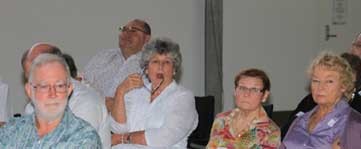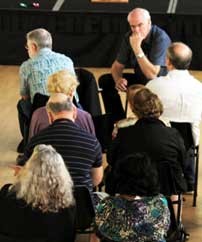 This is the key message you would have encountered while listening to this weekend’s readings. This particular reading has Jesus in dialogue with the crowds around him and with us, indicating his own incarnation, his own relationship with the Father, and yet implying that it is the learned, the wise or the clever who do not comprehend this great mystery. It is to the children that all has been revealed.
This is the key message you would have encountered while listening to this weekend’s readings. This particular reading has Jesus in dialogue with the crowds around him and with us, indicating his own incarnation, his own relationship with the Father, and yet implying that it is the learned, the wise or the clever who do not comprehend this great mystery. It is to the children that all has been revealed.
I find this to be so true. Children do not seem to have any qualms about believing in God and trusting in God’s presence. I observe the very few children who come to the Cathedral on a Sunday night, as well as my own grandchildren, and they seem to be fully at home in this sacred space. It seems as humans grow and mature, the secular world of rationality becomes the norm and the place of faith and mystery is overridden by science and reason. Our response to God should not be a learned, knowledgeable one but indeed a heart response. I am sure that both sides of our brain are of equal importance and value, for that is what it means to be human - our capacity to think rationally and non-rationally, creatively and cognitively. We are invited to hold both in balance.
I will now return to the Cathedral Lecture, Christian Faith in a Secular Age, given by Fr James McEvoy a couple of weeks ago. However, he also spoke in a number of locations around the diocese. In my message of two weeks ago, I introduced to you the idea of a ‘culture of authenticity’, from Charles Taylor, and the emergence of the need for church to be in dialogue with individuals and with society, because humans have a strong desire, a searching, a seeking, to make sense of existence. The Second Vatican Council, in Gaudium et Spes says that the Church’s “mission of a religious nature produces a function, enlightenment and resources which can be of service in construction and strengthening the human community” (GS 42). It goes on to say that a believing community must constantly keep itself open to its context, in order to hear that to which it is called:
It is for God’s people as a whole, with the help of the Holy Spirit, and especially for pastors and theologians, to listen to the various voices of our day, discerning them and interpreting them, and to evaluate them in the light of the divine word. So that the revealed truth can be increasingly appropriated, better understood and more suitably expressed. (GS 44)
 McEvoy states that “the type of dialogue envisaged in Gaudium et Spes could be put in these terms: the church, founded in the gospel, responds to the desires and struggles of this age, while listening for the voice of the Spirit in the world.”
McEvoy states that “the type of dialogue envisaged in Gaudium et Spes could be put in these terms: the church, founded in the gospel, responds to the desires and struggles of this age, while listening for the voice of the Spirit in the world.”
In exploring the need for a conversation between faith and our secular age, McEvoy states “that human existence is fundamentally dialogical. Every person comes to a sense of self and exists only through dialogue. So, rather than dialogue describing one human activity among others, it better describes the fundamental dynamism through which people discover and form their identities.” This dialogue is not only verbal and non-verbal but also has a number of contexts: social, cultural, linguistic and historical.
McEvoy then turns to the work of German philosopher, Hans-Georg Gadamer and the work of Charles Taylor, in proposing that deep conversation includes three integral elements:
- A profound openness to the perspectives of others (no listening; no dialogue) - We are not being asked to lessen our commitment to the love of God revealed in Jesus Christ, but the Holy Spirit is offered to all – individuals, society, peoples, cultures and religions in all times and places. God will be revealed more truthfully.
- A reappraisal of one’s own assumptions about the other’s perspective - The process of conversation leads me to reflect on, and refine, my own expectations and assumptions. This may lead us to a new understanding of the significance of the gospel in the new context. It is this dialogue that may lead Christians more deeply into their faith in the God of Jesus Christ.
- A process of being led “into a communion in which we do not remain what we were” – Gadamer in Truth and Method states:
 In a successful conversation, they both [the dialogue partners] come under the influence of the truth of the object and are thus bound to one another in a new community. To reach an understanding in dialogue is not merely a matter of putting oneself forward and successfully asserting one’s own point of view, but being transformed into a communion in which we do not remain what we were.
In a successful conversation, they both [the dialogue partners] come under the influence of the truth of the object and are thus bound to one another in a new community. To reach an understanding in dialogue is not merely a matter of putting oneself forward and successfully asserting one’s own point of view, but being transformed into a communion in which we do not remain what we were.
It is from this, that we can understand the joy of spiritual accompaniment. Tomas Halik, a Czechoslovakian theologian, explains such accompaniment:
Accompaniment involves partnership, dialogue, solidarity and mutual respect. Accompaniment requires generosity: if someone makes you go one mile with them, go two miles. Accompaniment also calls for courage to leave one’s familiar territory and grant the person we are accompanying the freedom to choose their own direction and goal, even if it means that one’s paths subsequently diverge at some point. Dialogue implies the possibility that the attitude of both partners might change – and that “risk” should be viewed as an opportunity.
 Dialogue requires partnership, conversation, mutual respect, generosity, courage, transformation, risk, being attentive and solidarity. I wonder how open we are to creating a space for open conversation and hospitality.
Dialogue requires partnership, conversation, mutual respect, generosity, courage, transformation, risk, being attentive and solidarity. I wonder how open we are to creating a space for open conversation and hospitality.
This is indeed a challenge, and so I finish this week’s message with a quote from Jean Vanier who established L’Arche communities:
The mission of a community is to give life to others, that is to say, to transmit new hope and new meaning to them. Mission is revealing to others their fundamental beauty, value and importance in the universe, their capacity to love, to grow and to do beautiful things and to meet God. Mission is transmitting to people a new inner freedom and hope; it is unlocking the doors of their being so that new energies can flow; it is taking away from their shoulders the terrible yoke of guilt and fear. To give life to people is to reveal to them that they are loved just as they are by God, with the mixture of good and evil, light and darkness that is in them; that the stone in front of their tomb in which all the dirt of their lives has been hidden can be rolled away. They are forgiven; they can live in freedom.
I hope you are open to contemplating the depth of the content of this message courtesy of James McEvoy. I will be around the diocese over the next two weeks, accompanying the Diocesan Council for Ministry with Young People (DCMYP), hopefully engaging in dialogue with those who come to the focus group meetings about Young People, the Faith and Vocational Discernment, in preparation for the Synod of Bishops XV Ordinary General Assembly in Rome in October, 2018. This is an opportunity for anyone to be part of the synod’s phase of consultation with the entire People of God.

